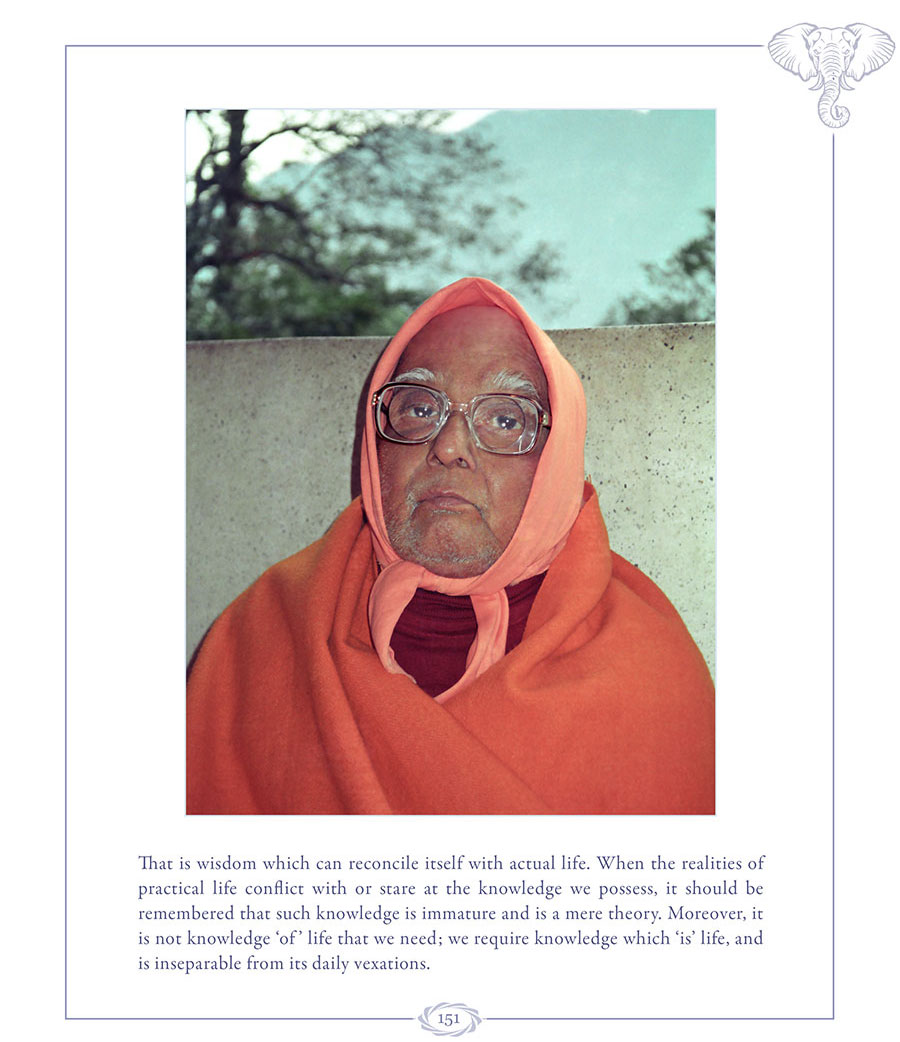A Study of the Bhagavadgita :12.3 - Swami Krishnananda.
========================================================================
=======================================================================
Wednesday, June 22, 2022. 21:30.
Chapter 12: Communing with the Absolute through the Cosmic Tree - 3.
=========================================================================
Taccintanaṃ tatkathanam anyonyaṃ tatprabhodhanam, etad ekaparatvaṃ ca brahmābhyāsaṃ vidur budhāḥ (Panchadasi 7.106).
Brahmārpaṇaṁ brahma havir brahmāgnau brahmaṇā hutam, brahmaiva tena gantavyaṁ brahmakarmasamādhinā (Gita 4.24).
These verses tell us that our occupation in daily life should also get melted down into the very process of meditation. Work and meditation do not stand apart in jnana. There is no secular life and spiritual life isolated from each other. In jnana, in wisdom of God, there is no secularity, materiality, externality, personality. All 'ities' vanish. There is only the wisdom of existence, wherein one beholds all things everywhere. If a jnanin talks, he does not talk on any other subject. And when he discourses to people, he will not discourse on anything else. He will try to elevate people to the consciousness of the Infinite Existence of God and depend on the grace of God only. The Gita also tells us tadbuddhayas tadātmānas (Gita 5.17): The mind is sunk in it, the intellect is entirely devoted to it, and the soul is totally inseparable. Depending on that only even for your sustenance, such a thing is jnana, which is hard for anyone to practice because it depends mostly on external factors, under conditions of bodily existence and, to some extent, sensory activity.
If you find that to be difficult, the Lord adds more. Without expecting any word from the disciple, the Teacher, the Master, the Guru apprehends the difficulties that are possible in the case of an ordinary seeker, and without even a question raised, the answer comes as an emendation of the first doctrine of jnana: If this is not possible, go on practicing again and again the same routine every day, whether you succeed or not. A continuous day-to-day maintenance of the consciousness of God's omnipresence as jnana may be difficult, but you may try for it at least. By practice you become perfect. Sit for meditation at a particular time, at any time as is convenient to you, and do not forget to be seated for meditation at this particular time. You may say the mind is not concentrating, it is not coming round. It does not matter; sit nevertheless. Make a decision that, "I have sat here for meditation to rouse in my mind the consciousness of God's existence." And every day if the sitting is done, one day or the other the mind will come round, and you will succeed. Repeated attempts on the part of a person to see that the consciousness of God enters one's mind can be assisted by the study of scriptures, the company of great masters and saints, etc.
Perhaps this is also not possible: "Even that repeated practice is difficult for me; my knees are aching and my back is paining in excruciating agony, and my mind is flitting from one thing to another thing; even my simple practice is difficult, let alone jnana, or the knowledge of God." The Lord says if the second prescription is also not fitting to you, love God with all your heart and all your soul and all your might. Can you not at least love? Are you so poor that even love is not possible? I am not asking you to concentrate your will or strain your intellect or reason. I am telling you some simple recipe. Be immensely affectionate to God. You can love God and want nothing else. Always wanting God is the highest sadhana, as you will realise one day or the other. If you do not want Him, all your efforts, concentration of will – dhyana, bhakti, karma – nothing will work. As love can emanate from a person spontaneously on account of the preponderance of the emotional faculty in oneself, loving God is considered as easier, especially in this age of distraction and sufferings of various kinds. The directing of one's feelings and emotions to God in utter devotion and surrender is to be considered as the best of Yogas. You need not go to Patanjali's Sutras or Yoga Vasishtha or the Upanishads; they are very difficult things. If you love anyone, the love is reciprocated automatically. Your affection will be felt even by animals and trees. Therefore, if you cannot sit for meditation every day and carry on this practice, at least in your heart be devoted to God.
To be continued ...
=========================================================================
==================================================





Comments
Post a Comment